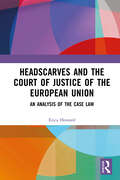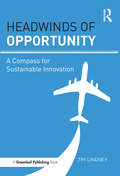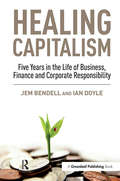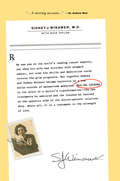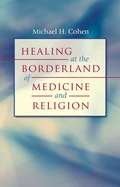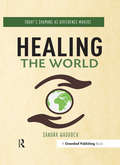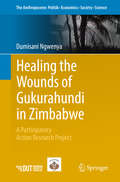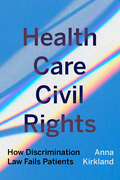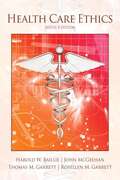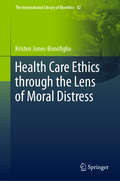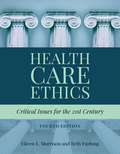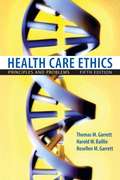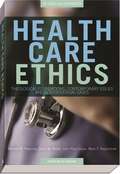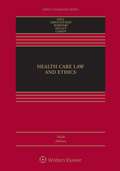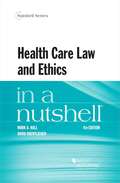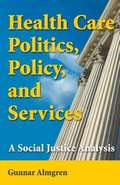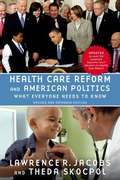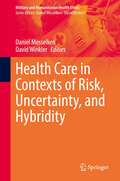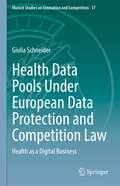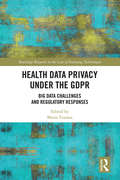- Table View
- List View
Heading Uptown
by Marissa PiesmanA Jewish lawyer by the name Nina Fischman finds herself investigating the murder of the main heir to a very large fortune.
Headscarves and the Court of Justice of the European Union: An Analysis of the Case Law
by Erica HowardThis book contains an in-depth examination of the Islamic headscarf cases of the Court of Justice of the European Union (CJEU) and places these against the background of the Islamophobia existing across Europe. It assesses how EU law can best protect women who want to wear headscarves at work for religious reasons and why this protection is important not only for the women themselves but also for the EU, taking into account its values as laid down in the Treaties, the Charter of Fundamental Rights of the EU and in the anti-discrimination Directives. It puts forward arguments for a finding that workplace neutrality bans constitute direct religion or belief discrimination and examines the way that the justification test for indirect discrimination has been applied by the CJEU. The work suggests that such bans could be more successfully challenged as gender and/or racial or ethnic origin discrimination, because the protection against these forms of discrimination is stronger. It also suggests that a claim for intersectional discrimination – on the grounds of gender, racial and ethnic origin, and religion or belief – should be possible in EU anti-discrimination law. The book will be of interest to academics, researchers and policy-makers working in the areas of equality and non-discrimination law, EU law and law and religion.
Headspace: Sniffer Dogs, Spy Bees and One Woman's Adventures in the Surveillance Society
by Amber MarksCrime detection has gone to the dogs and squirrels are being busted for espionage. If you've never wondered about the new direction of 'intelligence-led policing' in our society, now is the time to start. It was a chance encounter with a police sniffer-dog that drew criminal lawyer Amber Marks into the hidden world of the science of smell and its law-enforcement applications. Soon she stumbled into a wonderland of contemporary surveillance, where the spying skills of bees, dolphins and a myriad other critters were being harnessed to build a 'secure world' of bio-intelligence. From the businesses, scientists and military departments developing new smell-based surveillance technologies, to good old-fashioned police dogs, Amber discovered a secret world of security forces, where animals and scent are as important as intelligence agents and CCTV.Part polemical exploration of our burgeoning surveillance society, part humorous memoir, this intriguing book will capture your imagination and get you wondering: just who stands to benefit from all this 'security'?
Headwinds of Opportunity: A Compass for Sustainable Innovation
by Tim LindseyWinner of the Silver Axiom Business Book Award in the category of Sustainability. Headwinds of Opportunity goes beyond philosophical and academic discussion of business sustainability to offer strategic guidance regarding how to make all types of organizations function more sustainably while simultaneously improving their competitiveness. It differs from other books in that it approaches sustainability as an innovation – an innovative way of conducting business. The book is informed by time-tested principles of innovation diffusion that can be effectively applied to drive change. It places considerable emphasis on the "how-to" aspects of sustainability improvement and how they can be used to increase effectiveness.
Healing Capitalism: Five Years in the Life of Business, Finance and Corporate Responsibility
by Jem Bendell Ian DoyleThe global response from business to social and environmental issues during the past decade has created a corporate responsibility movement. But what has been the impact of this movement? The financial crisis that began in 2007 has led more and more people to question the fundamentals of our economic system. Now, some within the corporate responsibility movement are developing a vision and practice of a new form of capitalism, one that will require collective action to achieve. Bendell and Doyle draw on Lifeworth's annual reviews of corporate responsibility and explain how business leaders, stakeholders and related academe now need to experiment with new models that address the fundamental flaws of contemporary capitalism, including monetary systems, enterprise ownership, and regulation. This book will be a fantastic resource for business libraries, as it records and analyses key events, issues and trends in corporate responsibility during the first decade of the 21st century. It is a sequel and companion to Bendell's previous work, The Corporate Responsibility Movement.
Healing Lessons
by Sidney J WinawerDr. Sidney J. Winawer was one of the world's leading cancer experts. Yet when his wife Andrea was stricken with stomach cancer, not even his skills and dedication as a physician could reverse the grim prognosis. Together the couple explored complementary and alternative treatments. Healing Lessons is a testament to the strength of love and the story of a doctor's transformation--the new treatments he embraced and the lessons he learned on the opposite side of the doctor-patient relationship.
Healing at the Borderland of Medicine and Religion
by Michael H. CohenOne of the transformations facing health care in the twenty-first century is the safe, effective, and appropriate integration of conventional, or biomedical, care with complementary and alternative medical (CAM) therapies, such as acupuncture, chiropractic, massage therapy, herbal medicine, and spiritual healing. In Healing at the Borderland of Medicine and Religion, Michael H. Cohen discusses the need for establishing rules and standards to facilitate appropriate integration of conventional and CAM therapies. The kind of integrated health care many patients seek dwells in a borderland between the physical and the spiritual, between the quantifiable and the immeasurable, Cohen observes. But the present environment fails to present clear rules for clinicians regarding which therapies to recommend, accept, or discourage, and how to discuss patient requests regarding inclusion of such therapies. Focusing on the social, intellectual, and spiritual dimensions of integrative care and grounding his analysis in the attendant legal, regulatory, and institutional changes, Cohen provides a multidisciplinary examination of the shift to a more fluid, pluralistic health care environment.One of the transformations facing health care in the twenty-first century is the safe, effective, and appropriate integration of conventional (or biomedical) care with complementary and alternative medical (CAM) therapies, such as acupuncture, chiropractic, massage therapy, herbal medicine, and spiritual healing. Michael H. Cohen discusses the need for establishing rules and standards to facilitate appropriate integration of conventional and CAM therapies. The kind of integrated health care many patients seek dwells in a borderland between the physical and the spiritual. But the present environment fails to present clear rules for clinicians regarding which therapies to recommend, accept, or discourage, and how to discuss patient requests regarding inclusion of such therapies. Focusing on the social, intellectual, and spiritual dimensions of integrative care and grounding his analysis in the attendant legal, regulatory, and institutional changes, Cohen provides a multidisciplinary examination of the shift to a more fluid, pluralistic health care environment.-->
Healing the World: Today's Shamans as Difference Makers
by Sandra WaddockOur world is fraught with problems that demand attention: climate change, terrorism, poverty, and injustice to name only a few. Healing the World takes the fundamental teachings of shamans—the healer of communities—and applies them to the problems of today, using terms and concepts that anybody, from business leaders to activists, can relate to and understand. It helps people identify their own gifts and find the pathways forward to using those gifts in the world, no matter what their occupation, civic activity, or interests.
Healing the Wounds of Gukurahundi in Zimbabwe: A Participatory Action Research Project (The Anthropocene: Politik—Economics—Society—Science #19)
by Dumisani NgwenyaThis book is based on a participatory action research project carried out with a group of former Zimbabwe People's revolutionary Army (ZPRA) which was the armed wing of the Zimbabwe African People's Union (ZAPU) which was led by the late Joshua Nkomo. ZPRA was the primary target of Gukurahundi, a pogrom by the Mugabe government which left an estimated 20 000 civilians dead and countless others tortured in the early 1980s in Matebeleland, Zimbabwe. It has been almost 30 years since the violence ended, but there has never been an official healing and reconciliation programme or truth commission into the atrocities. The government chose the path of amnesia by granting a blanket amnesty to all involved. The regime has enforced a culture of silence over the event through repression and intimidation. The book is a culmination of a two year journey, by the group and the author, of an exploration of group-based self-healing approaches to the pain caused by the violence of Gukurahundi.
Health Care Civil Rights: How Discrimination Law Fails Patients
by Anna KirklandA free ebook version of this title is available through Luminos, University of California Press’s Open Access publishing program. Visit www.luminosoa.org to learn more. Focusing on the provision of gender-affirming care, Health Care Civil Rights analyzes the difficulties and potential of discrimination law in healthcare settings. The application of civil rights law could be a powerful response to health inequalities in the US, but conservative challenges and the complex and fragmented nature of our health care system have limited the real-world success of this strategy. Revealing deep divides and competing interests that reverberate through patient experiences, insurance claims, and courtroom arguments, Anna Kirkland explains what health care civil rights are, how they work in theory and practice, and how to strengthen them.
Health Care Ethics
by Harold Baillie John McGeehan Thomas Garrett Rosellen GarrettHealth Care Ethics is aclear, accessible text/reference that explores the full range of contemporary issues in health care ethics from a practical wisdom approach. The authors present the fundamental concerns of modern medical ethics―-autonomy, beneficence, justice, and confidentiality-―and then provide analysis, cases, and insights from professional literature to discuss them. Throughout, the discussion starts with larger issues or concepts and principles and then focuses on specific problems or complications.
Health Care Ethics through the Lens of Moral Distress (The International Library of Bioethics #82)
by Kristen Jones-BonofiglioThis book provides a bridge between the theory to practice gap in contemporary health care ethics. It explores the messiness of everyday ethical issues and validates the potential impacts on health care professionals as wounded healers who regularly experience close proximity to suffering and pain. This book speaks to why ethics matters on a personal level and how moral distress experiences can be leveraged instead of hidden. The book offers contributions to both scholarship and the profession. Nurses, physicians, social workers, allied health care professionals, as well as academics and students will benefit from this book.
Health Care Ethics: Critical Issues for the 21st Century (Fourth Edition)
by Eileen E. Morrison Beth Furlong<p>Organized around the four central themes of healthcare ethics (theoretical foundations and issues for individuals, organizations, and society), Health Care Ethics, Fourth Edition brings together the insights of a diverse panel of leading experts in the fields of bioethics, long-term care, and health administration, among others. Students will build on this critical platform to develop an extensive toolbox of analytical and problem-solving skills. <p>The fully revised and updated Fourth Edition addresses current changes in health care, including three new chapters covering ethical issues related to Health Information Management, Patient Safety, and Epidemics. All other chapters have been updated to reflect the most recent developments in medical technology and new challenges faced by health care professionals in the era of the ACA.
Health Care Ethics: Principles and Problems (5th edition)
by Thomas M. Garrett Rosellen M. Garrett Harold Baillie John F. McgeehanA revised edition that develops the principles used in American health care ethics and examines the problems of applying these principles to controversial situations. Among the issues discussed are patient autonomy and confidentiality, and new methods of reproduction. This volume addresses not only the ethical problems of health care providers, but addresses the concerns of patients as well.
Health Care Ethics: Theological Foundations, Contemporary Issues, and Controversial Cases
by Michael R. Panicola David M. Belde John Paul Slosar Mark F. RepenshekThis Revised and Expanded Edition addresses complex and controversial health care issues that are very much a part of our everyday lives. Using a normative framework, the authors incorporate specific issues, case studies, and multimedia aides in each chapter to encourage students to engage in moral discourse and reflection. The authors' stimulating faith-based discussion of how particular circumstances in society have an impact on ethical decision making is a significant contribution to our understanding of the complex relationship between health care issues and ethics.
Health Care Law And Ethics (Aspen Casebook)
by Mark A. Hall Mary Anne Bobinski David Orentlicher I. Glenn Cohen Nicholas BagleyHealth Care Law and Ethics, Ninth Edition offers a relationship-oriented approach to health law—covering the essentials, as well as topical and controversial subjects. The book provides thoughtful and teachable coverage of every aspect of health care law. Current and classic cases build logically from the fundamentals of the patient/provider relationship to the role of government and institutions in health care. The book is adaptable to both survey courses and courses covering portions of the field. Key Features: New authors Nick Bagley and Glenn Cohen Incorporated anticipated changes to the Affordable Care Act More current cases and more streamlined notes, including ones on medical malpractice, bioethics, and on finance and regulation More coverage of “conscientious objection” and “big data” - Discussion of new “value based” methods of physician payment - Expanded coverage of “fraud and abuse” Current issues in public health (e.g., Ebola, Zika) and controversies in reproductive choice (e.g., Hobby Lobby) Coverage of cutting-edge genetic technologies (e.g., gene editing and mitochondrial replacement)
Health Care Law And Ethics In A Nutshell
by David Orentlicher Mark HallPublic policy responses to escalating medical costs and constrained access pose fundamental challenges to health care law. Profound medical advances also generate many ethical dilemmas. This authoritative discussion considers how law and ethics respond to these driving social, economic, and political forces of innovation, crisis and reform. Topics include health insurance reform, health care finance and delivery structures, treatment relationships, facility and insurance regulation, corporate and tax law, refusal of life support, organ donation, and reproductive technologies.
Health Care Politics, Policy and Services: A Social Justice Analysis
by Gunnar AlmgrenThis is an outstanding book which examines the ecology, organization, and financing of health care policies and practices. The social justice perspective provides an original framework for incorporating the consequences of discrimination, oppression, economic injustice, empowerment, and reconciliation into health care policies and practices.
Health Care Reform and American Politics: What Everyone Needs to Know
by Lawrence R. Jacobs Theda SkocpolThe Patient Protection and Affordable Care Act signed by President Obama in March 2010 is a landmark in U. S. social legislation, and the Supreme Court's recent decision upholding the Act has ensured that it will remain the law of the land. The new law extends health insurance to nearly all Americans, fulfilling a century-long quest and bringing the United States to parity with other industrial nations. Affordable Care aims to control rapidly rising health care costs and promises to make the United States more equal, reversing four decades of rising disparities between the very rich and everyone else. Millions of people of modest means will gain new benefits and protections from insurance company abuses - and the tab will be paid by privileged corporations and the very rich. How did such a bold reform effort pass in a polity wracked by partisan divisions and intense lobbying by special interests? What does Affordable Care mean-and what comes next? In this updated edition of Health Care Reform and American Politics: What Everyone Needs to Know®, Lawrence R. Jacobs and Theda Skocpol-two of the nation's leading experts on politics and health care policy-provide a concise and accessible overview. They explain the political battles of 2009 and 2010, highlighting White House strategies, the deals Democrats cut with interest groups, and the impact of agitation by Tea Partiers and progressives. Jacobs and Skocpol spell out what the new law can do for everyday Americans, what it will cost, and who will pay. In a new section, they also analyze the impact the Supreme Court ruling that upheld the law. Above all, they explain what comes next, as critical yet often behind-the-scenes battles rage over implementing reform nationally and in the fifty states. Affordable Care still faces challenges at the state level despite the Court ruling. But, like Social Security and Medicare, it could also gain strength and popularity as the majority of Americans learn what it can do for them. What Everyone Needs to Know® is a registered trademark of Oxford University Press.
Health Care and EU Law
by Erika Szyszczak Markus Krajewski Johan Willem Gronden Ulla NeergaardThe aim of the present volume is to explore the consequences of the impact of the EU rules for the internal market (including the proposed Directive on patients' rights) and competition on national health care systems. It will also address how related areas, such as EU public procurement law and WTO law, influence national healthcare organisation and Member State autonomy.
Health Care and EU Law (Legal Issues of Services of General Interest)
by Erika Szyszczak Markus Krajewski Ulla Neergaard Johan Willem van de GrondenThe EU has only limited competence to regulate national health-care systems but recent developments have shown that health care is not immune from the effects of EU law. As Member States have increasingly experimented with new forms of funding and the delivery of health-care and social welfare services, health-care issues have not escaped scrutiny from the EU internal market and from competition and procurement rules. The market-oriented EU rules now affect these national experiments as patients and health-care providers turn to EU law to assert certain rights. The recent debates on the (draft) Directive on Patients’ Rights further underline the importance, but also the difficulty (and controversy), of allowing EU law to regulate health care.The topicality of the range of issues related to health care and EU law was addressed, in October 2009, at a conference held in Nijmegen, The Netherlands. The present volume contains inter alia the proceedings of this conference and invited essays. This volume follows the publication of The Changing Legal Framework for Services of General Interest in Europe. Between Competition and Solidarity (Krajewski M et al (eds) (2009) T.M.C. Asser Press, The Hague) and launches a new series: Legal Issues of Services of General Interest. The aim of the series is to sketch the framework for services of general interest in the EU and to explore the issues raised by developments related to these services.The book is compulsory reading for everyone who is engaged in issues relating to health care and EU law.Johan van de Gronden is Professor of European Law at the Law Faculty of the Radboud University Nijmegen, the Netherlands. Erika Szyszczak is a Jean Monnet Professor of European Law ad personam and Professor of European Competition and Labour Law at the University of Leicester, UK. Ulla Neergaard is Professor of EU law at the Law Faculty of the University of Copenhagen, Denmark. Markus Krajewski is Professor of International Public Law, Faculty of Law, University of Erlangen-Nuremberg, Germany.
Health Care in Contexts of Risk, Uncertainty, and Hybridity (Military and Humanitarian Health Ethics)
by Daniel Messelken David WinklerThis book sheds light on various ethical challenges military and humanitarian health care personnel (HCP) face while working in adverse conditions. Contexts of armed conflict, hybrid wars or other forms of violence short of war, as well as natural disasters, all have in common that ordinary circumstances can no longer be taken for granted. Hence, the provision of health care has to adapt, for example, to a different level of risk, to scarce resources, or uncommon approaches due to external incentives or requirements. This affects the practice of health care as well as its ethics. This book offers a panoramic overview on various challenges healthcare faces in extraordinary situations and provides new insights from practitioners’ as well as from academic scholars’ perspectives.
Health Data Pools Under European Data Protection and Competition Law: Health as a Digital Business (Munich Studies on Innovation and Competition #17)
by Giulia SchneiderThis book explores the emerging economic reality of health data pools from the perspective of European Union policy and law. The contractual sharing of health data for research purposes is giving rise to a free movement of research data, which is strongly encouraged at European policy level within the Digital Single Market Strategy. However, it has also a strong impact on data subjects' fundamental right to data protection and smaller businesses and research entities ability to carry out research and compete in innovation markets. Accordingly the work questions under which conditions health data sharing is lawful under European data protection and competition law. For these purposes, the work addresses the following sub-questions: i) which is the emerging innovation paradigm in digital health research?; ii) how are health data pools addressed at European policy level?; iii) do European data protection and competition law promote health data-driven innovation objectives, and how?; iv) which are the limits posed by the two frameworks to the free pooling of health data? The underlying assumption of the work is that both branches of European Union law are key regulatory tools for the creation of a common European health data space as envisaged in the Commissions 2020 European strategy for data. It thus demonstrates that both European data protection law, as defined under the General Data Protection Regulation, and European competition law and policy set research enabling regimes regarding health data, provided specific normative conditions are met. From a further perspective, both regulatory frameworks place external limits to the freedom to share (or not share) research valuable data.
Health Data Privacy under the GDPR: Big Data Challenges and Regulatory Responses (Routledge Research in the Law of Emerging Technologies)
by Maria TzanouThe growth of data-collecting goods and services, such as ehealth and mhealth apps, smart watches, mobile fitness and dieting apps, electronic skin and ingestible tech, combined with recent technological developments such as increased capacity of data storage, artificial intelligence and smart algorithms, has spawned a big data revolution that has reshaped how we understand and approach health data. Recently the COVID-19 pandemic has foregrounded a variety of data privacy issues. The collection, storage, sharing and analysis of health- related data raises major legal and ethical questions relating to privacy, data protection, profiling, discrimination, surveillance, personal autonomy and dignity. This book examines health privacy questions in light of the General Data Protection Regulation (GDPR) and the general data privacy legal framework of the European Union (EU). The GDPR is a complex and evolving body of law that aims to deal with several technological and societal health data privacy problems, while safeguarding public health interests and addressing its internal gaps and uncertainties. The book answers a diverse range of questions including: What role can the GDPR play in regulating health surveillance and big (health) data analytics? Can it catch up with internet-age developments? Are the solutions to the challenges posed by big health data to be found in the law? Does the GDPR provide adequate tools and mechanisms to ensure public health objectives and the effective protection of privacy? How does the GDPR deal with data that concern children’s health and academic research? By analysing a number of diverse questions concerning big health data under the GDPR from various perspectives, this book will appeal to those interested in privacy, data protection, big data, health sciences, information technology, the GDPR, EU and human rights law.

